期末复习课件----八年级下册Unit 6 Topic 1 We're going on a three-day visit to Mount Tai. (共24张PPT) 2023-2024学年仁爱
文档属性
| 名称 | 期末复习课件----八年级下册Unit 6 Topic 1 We're going on a three-day visit to Mount Tai. (共24张PPT) 2023-2024学年仁爱 | 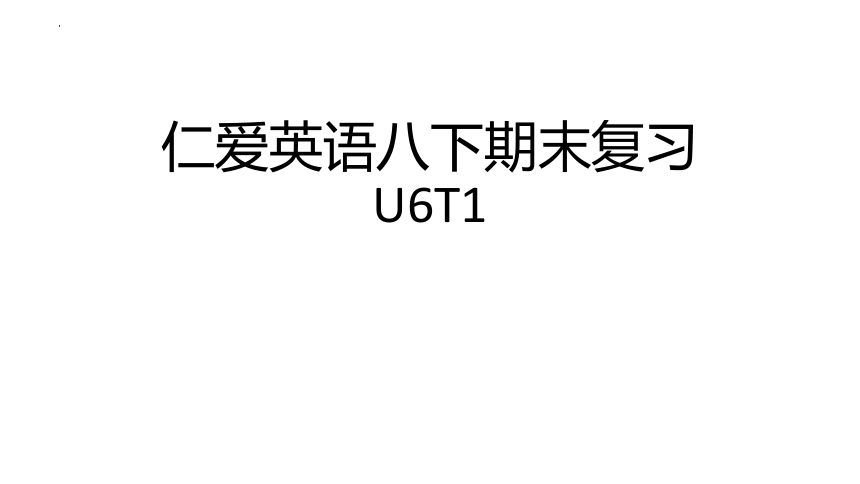 | |
| 格式 | pptx | ||
| 文件大小 | 117.0KB | ||
| 资源类型 | 教案 | ||
| 版本资源 | 仁爱科普版 | ||
| 科目 | 英语 | ||
| 更新时间 | 2024-05-20 16:28:39 | ||
图片预览

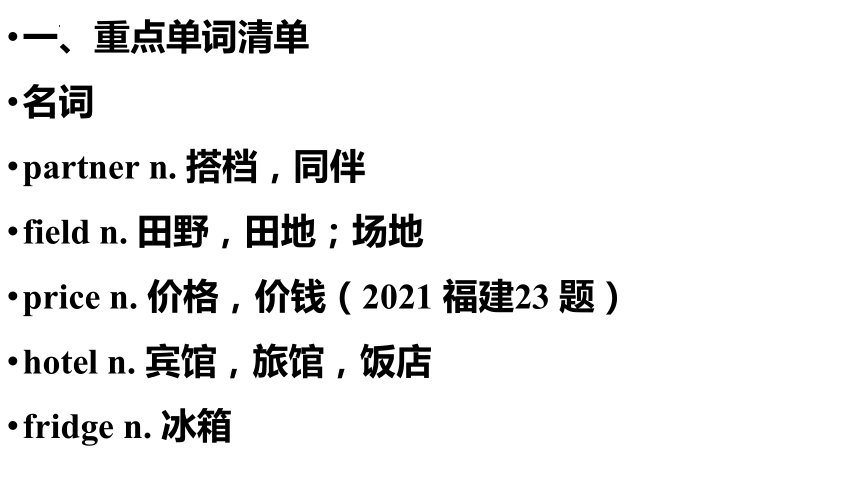
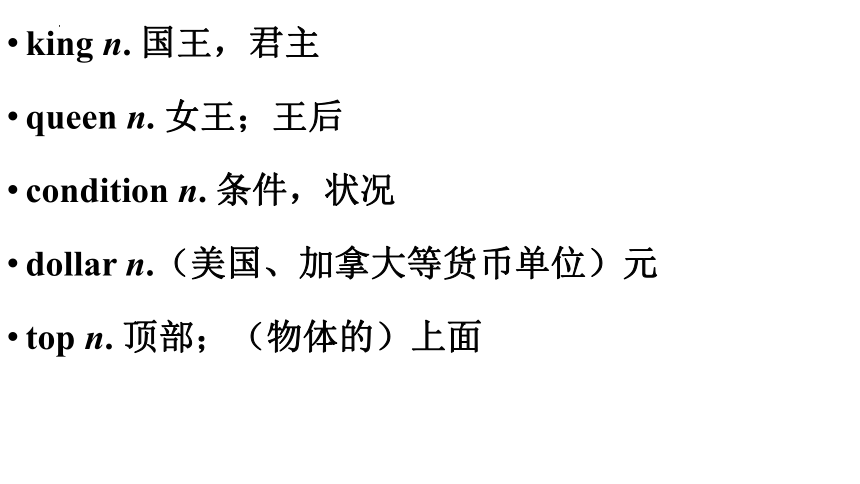
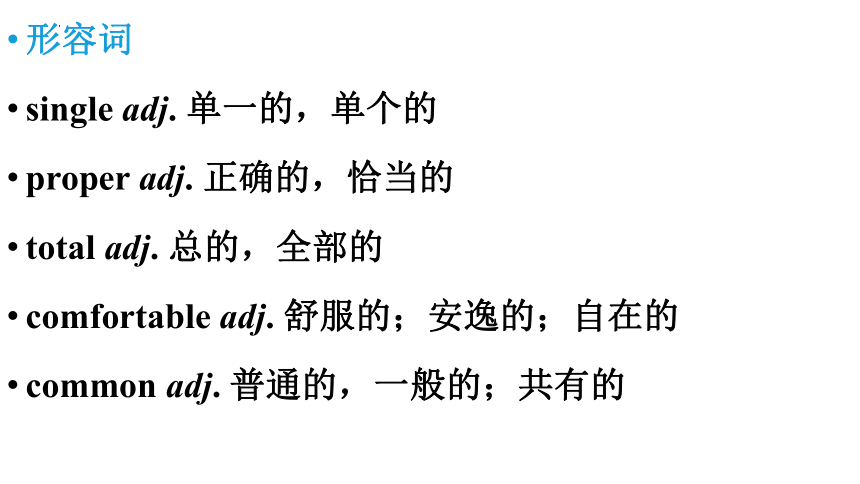
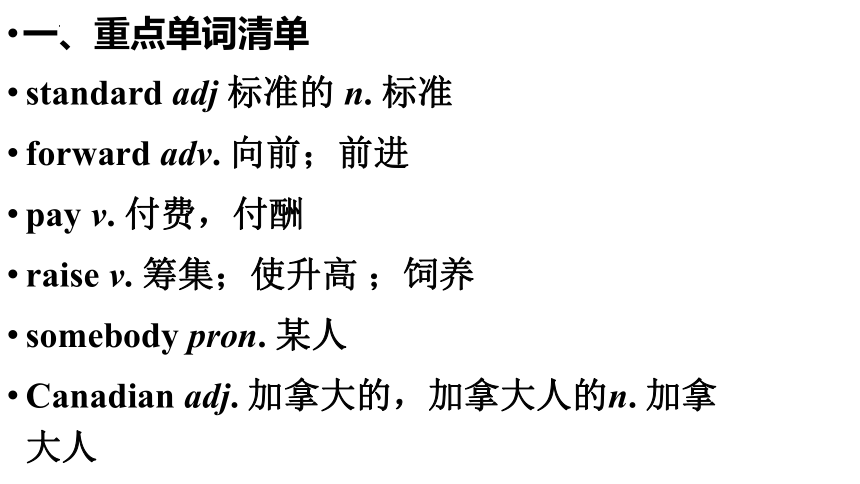
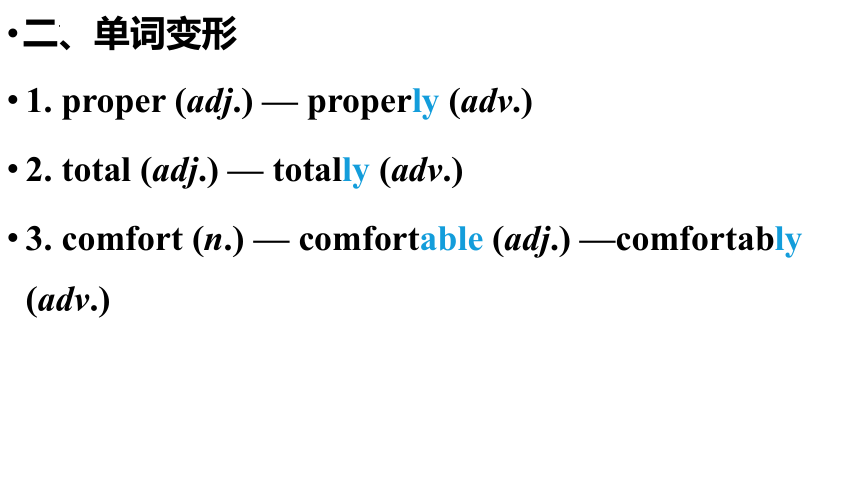
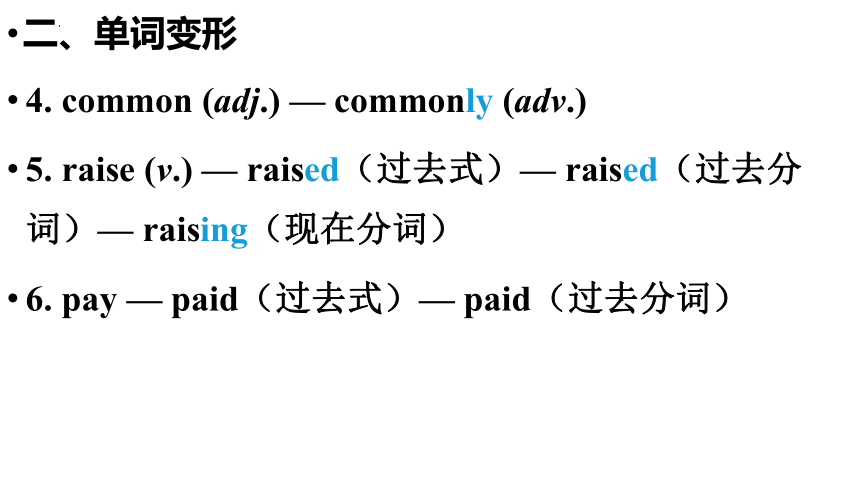
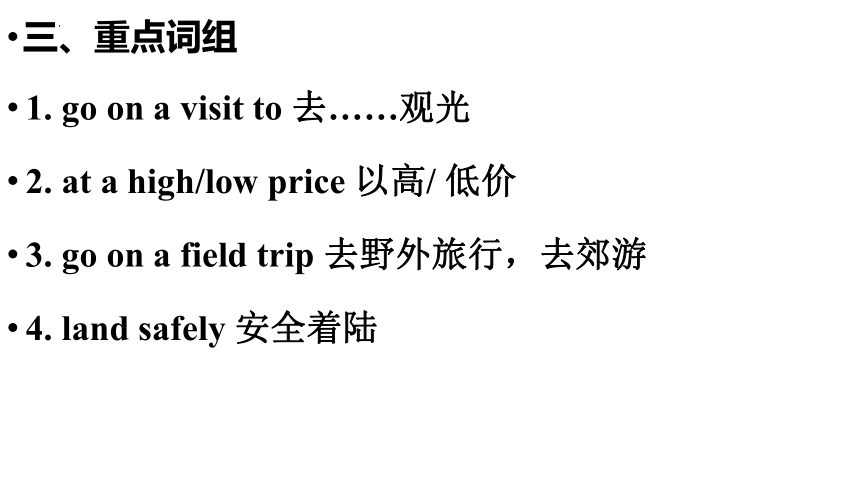
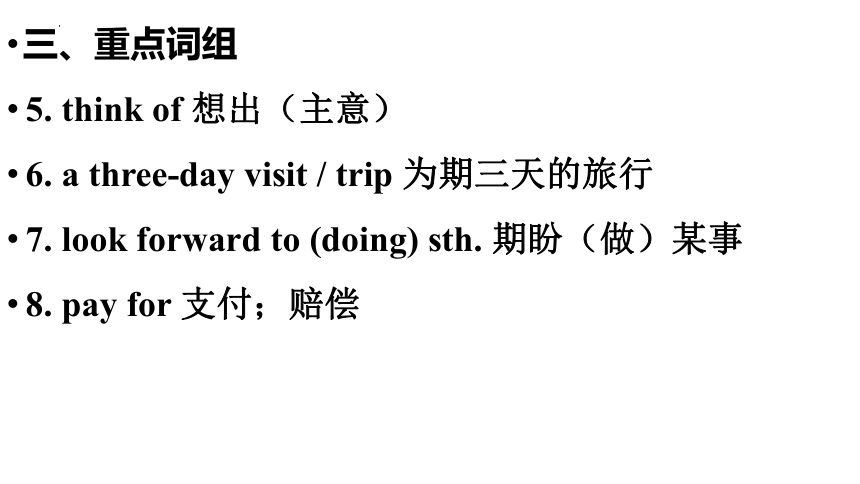
文档简介
(共24张PPT)
仁爱英语八下期末复习
U6T1
一、重点单词清单
名词
partner n. 搭档,同伴
field n. 田野,田地;场地
price n. 价格,价钱(2021 福建23 题)
hotel n. 宾馆,旅馆,饭店
fridge n. 冰箱
king n. 国王,君主
queen n. 女王;王后
condition n. 条件,状况
dollar n.(美国、加拿大等货币单位)元
top n. 顶部;(物体的)上面
形容词
single adj. 单一的,单个的
proper adj. 正确的,恰当的
total adj. 总的,全部的
comfortable adj. 舒服的;安逸的;自在的
common adj. 普通的,一般的;共有的
一、重点单词清单
standard adj 标准的 n. 标准
forward adv. 向前;前进
pay v. 付费,付酬
raise v. 筹集;使升高 ;饲养
somebody pron. 某人
Canadian adj. 加拿大的,加拿大人的n. 加拿大人
二、单词变形
1. proper (adj.) — properly (adv.)
2. total (adj.) — totally (adv.)
3. comfort (n.) — comfortable (adj.) —comfortably (adv.)
二、单词变形
4. common (adj.) — commonly (adv.)
5. raise (v.) — raised(过去式)— raised(过去分词)— raising(现在分词)
6. pay — paid(过去式)— paid(过去分词)
三、重点词组
1. go on a visit to 去……观光
2. at a high/low price 以高/ 低价
3. go on a field trip 去野外旅行,去郊游
4. land safely 安全着陆
三、重点词组
5. think of 想出(主意)
6. a three-day visit / trip 为期三天的旅行
7. look forward to (doing) sth. 期盼(做)某事
8. pay for 支付;赔偿
9. raise money 筹钱
10. hear from sb. 收到某人的来信
11. put on a show 举办演出
12. a standard room 标准间;标准客房
13. decide on the best way to travel 选定旅行的最好方式
14. start out by bus 乘公共汽车出发
15. living standard 生活水平,生活标准
16. book tickets 订票
17. the hard / soft sleeper 硬/ 软卧
功能句
预订和计划
1. We are going on a visit to Xiamen tomorrow.
2. I’d like to book two tickets to Mount Wuyi on July 21st.
3. Let’s find out some information about the hotel.
4. May I have your name and telephone number, sir
5. I’m looking forward to hearing from you.
四、重点语法用法
1. raise 的用法
It is very important to raise money for the poor because they need help.
为穷人筹集资金非常重要,因为他们需要帮助。
用法归纳
辨析 用法 例句/ 词
raise
筹集(资金);征集(人员)
raise money 筹钱;
raise an army 招兵
“提升”,后接宾语,强调“把某物举起”
raise one’s hand 举手
增加;提高
raise prices 提高价格
抚养;养育
raise pets 养宠物
辨析 用法 例句/ 词
rise
“上升”,后不接宾语,强调“某人/ 某物自
己站/ 升起来”
The sun rises. 太阳升起。
The river rises. 河水上涨。
用法归纳
on
in
当表示在具体某一天的早晨/ 下午/ 晚上,或者说出该天的天气状况时,要使用介词on
on a windy morning, on Wednesday afternoon, on the evening of March 12th
一般表示在早晨/ 下午/ 晚上
in the morning/ afternoon/evening
2. hear from 的用法
David is my pen pal. I’m glad to hear from him today.
戴维是我的笔友。今天我很高兴收到他的来信。
hear from 后跟人,
意为“收到某人来信”。
hear of/about
后跟事物或人,意为“听说某事/ 某物/ 某人”。
例句: [ 福建人文信息] —Have you ever heard of Mount Guanzhai
你曾经听说过冠豸山吗?
— Yes. It’s beautiful and lies in the west of Fujian.
是的。它很美丽并且位于福建的西部。
语法 ——动词不定式
动词 不定 式的 用法
作主语
常用it 作形式主语,而将真正的主语后置
例句: It is important to take exercise.=To take exercise is important. 锻炼身体是重要的。
动词 不定 式的 用法
作宾语
常见的动词有:agree, plan, help, decide, refuse, dare, wish, hope, choose, want, expect, fail, manage 等
例句: They agreed to start early.
他们同意早点儿动身。
作表语
表示愿望、目的、计划等。不定式作表语的句子可转换为不定式作主语的句子
例句: His wish is to be an astronaut. =To be an astronaut is his wish. 他的愿望是成为一名宇航员。
动词 不定 式的 用法
作宾语补足语
常见的动词有:ask, tell, want, order, teach, wish, warn, allow 等
例句: Jenny asks me to help her with her English.
珍妮让我帮她学英语。
作定语
位于所修饰的词之后。有时动词不定式与被修饰词之间存在逻辑上的动宾关系
例句: She has a lot of work to do.
她有许多工作要做。
动词 不定 式的 用法
作状语
目的状语
例句: To catch up with her classmates, she always stays up late. 为了赶上她的同学,她总是熬夜到很晚。
原因状语
例句: I am sorry to hear that he is ill.
听说他病了,我很难过。
结果状语
例句: The room is large enough to hold 1,200 people. 这个房间足够大,能够容纳1200 人。
仁爱英语八下期末复习
U6T1
一、重点单词清单
名词
partner n. 搭档,同伴
field n. 田野,田地;场地
price n. 价格,价钱(2021 福建23 题)
hotel n. 宾馆,旅馆,饭店
fridge n. 冰箱
king n. 国王,君主
queen n. 女王;王后
condition n. 条件,状况
dollar n.(美国、加拿大等货币单位)元
top n. 顶部;(物体的)上面
形容词
single adj. 单一的,单个的
proper adj. 正确的,恰当的
total adj. 总的,全部的
comfortable adj. 舒服的;安逸的;自在的
common adj. 普通的,一般的;共有的
一、重点单词清单
standard adj 标准的 n. 标准
forward adv. 向前;前进
pay v. 付费,付酬
raise v. 筹集;使升高 ;饲养
somebody pron. 某人
Canadian adj. 加拿大的,加拿大人的n. 加拿大人
二、单词变形
1. proper (adj.) — properly (adv.)
2. total (adj.) — totally (adv.)
3. comfort (n.) — comfortable (adj.) —comfortably (adv.)
二、单词变形
4. common (adj.) — commonly (adv.)
5. raise (v.) — raised(过去式)— raised(过去分词)— raising(现在分词)
6. pay — paid(过去式)— paid(过去分词)
三、重点词组
1. go on a visit to 去……观光
2. at a high/low price 以高/ 低价
3. go on a field trip 去野外旅行,去郊游
4. land safely 安全着陆
三、重点词组
5. think of 想出(主意)
6. a three-day visit / trip 为期三天的旅行
7. look forward to (doing) sth. 期盼(做)某事
8. pay for 支付;赔偿
9. raise money 筹钱
10. hear from sb. 收到某人的来信
11. put on a show 举办演出
12. a standard room 标准间;标准客房
13. decide on the best way to travel 选定旅行的最好方式
14. start out by bus 乘公共汽车出发
15. living standard 生活水平,生活标准
16. book tickets 订票
17. the hard / soft sleeper 硬/ 软卧
功能句
预订和计划
1. We are going on a visit to Xiamen tomorrow.
2. I’d like to book two tickets to Mount Wuyi on July 21st.
3. Let’s find out some information about the hotel.
4. May I have your name and telephone number, sir
5. I’m looking forward to hearing from you.
四、重点语法用法
1. raise 的用法
It is very important to raise money for the poor because they need help.
为穷人筹集资金非常重要,因为他们需要帮助。
用法归纳
辨析 用法 例句/ 词
raise
筹集(资金);征集(人员)
raise money 筹钱;
raise an army 招兵
“提升”,后接宾语,强调“把某物举起”
raise one’s hand 举手
增加;提高
raise prices 提高价格
抚养;养育
raise pets 养宠物
辨析 用法 例句/ 词
rise
“上升”,后不接宾语,强调“某人/ 某物自
己站/ 升起来”
The sun rises. 太阳升起。
The river rises. 河水上涨。
用法归纳
on
in
当表示在具体某一天的早晨/ 下午/ 晚上,或者说出该天的天气状况时,要使用介词on
on a windy morning, on Wednesday afternoon, on the evening of March 12th
一般表示在早晨/ 下午/ 晚上
in the morning/ afternoon/evening
2. hear from 的用法
David is my pen pal. I’m glad to hear from him today.
戴维是我的笔友。今天我很高兴收到他的来信。
hear from 后跟人,
意为“收到某人来信”。
hear of/about
后跟事物或人,意为“听说某事/ 某物/ 某人”。
例句: [ 福建人文信息] —Have you ever heard of Mount Guanzhai
你曾经听说过冠豸山吗?
— Yes. It’s beautiful and lies in the west of Fujian.
是的。它很美丽并且位于福建的西部。
语法 ——动词不定式
动词 不定 式的 用法
作主语
常用it 作形式主语,而将真正的主语后置
例句: It is important to take exercise.=To take exercise is important. 锻炼身体是重要的。
动词 不定 式的 用法
作宾语
常见的动词有:agree, plan, help, decide, refuse, dare, wish, hope, choose, want, expect, fail, manage 等
例句: They agreed to start early.
他们同意早点儿动身。
作表语
表示愿望、目的、计划等。不定式作表语的句子可转换为不定式作主语的句子
例句: His wish is to be an astronaut. =To be an astronaut is his wish. 他的愿望是成为一名宇航员。
动词 不定 式的 用法
作宾语补足语
常见的动词有:ask, tell, want, order, teach, wish, warn, allow 等
例句: Jenny asks me to help her with her English.
珍妮让我帮她学英语。
作定语
位于所修饰的词之后。有时动词不定式与被修饰词之间存在逻辑上的动宾关系
例句: She has a lot of work to do.
她有许多工作要做。
动词 不定 式的 用法
作状语
目的状语
例句: To catch up with her classmates, she always stays up late. 为了赶上她的同学,她总是熬夜到很晚。
原因状语
例句: I am sorry to hear that he is ill.
听说他病了,我很难过。
结果状语
例句: The room is large enough to hold 1,200 people. 这个房间足够大,能够容纳1200 人。
同课章节目录
- Unit 5 Feeling excited
- Topic 1 You look excited
- Topic 2 I’m feeling better now.
- Topic 3 Many things can affect our feelings.
- Unit 6 Enjoying Cycling
- Topic 1 We're going on a three-day visit to Mount
- Topic 2 How about exploring Tian’anmen Square?
- Topic 3 Bicycle riding is good exercise.
- Unit 7 Food festival
- Topic 1 We’re preparing for a food festival.
- Topic 2 I’m not sure whether I can cook it well.
- Topic 3 I Cooked the Most Successfully
- Unit 8 Our Clothes
- Topic 1 We will have a class fashion show.
- Topic 2 We can design our own uniforms.
- Topic 3 He said the fashion show was wonderful.
